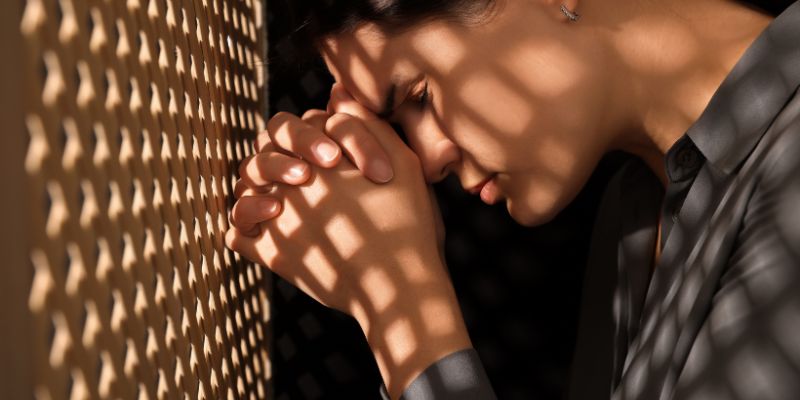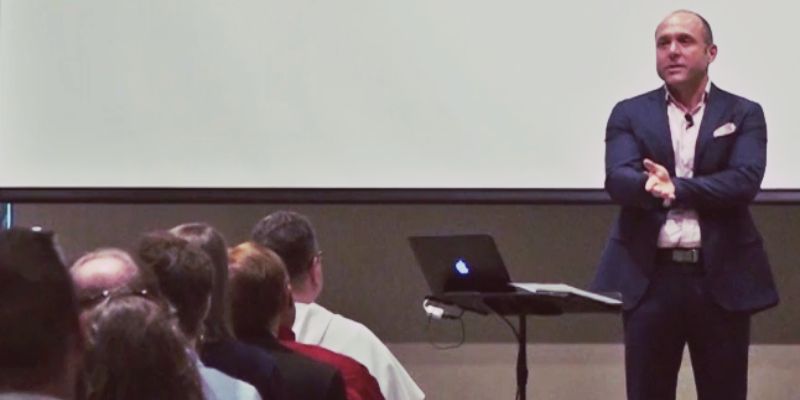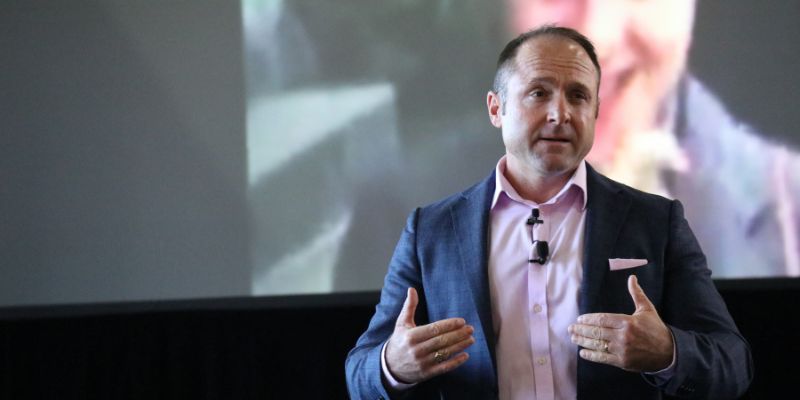Welcome to the Catholic Teacher Daily Podcast, where Catholic leadership meets virtue. In this episode, Jonathan Doyle discusses the vital role of virtue-based leadership in Catholic education. Join us as we explore how cultivating virtues like prudence and fortitude enhances leadership effectiveness and fosters holiness within school communities.
Welcome Aboard
Hello there, my friend. Jonathan Doyle is with you. Welcome aboard once again to the Catholic Teacher Daily Podcast, which is simultaneously a video. So if you’re hearing this on the podcast version, you’ll think it’s a different mic.
I am on a speaking tour here in Tasmania, and so I am doing this in the hotel room. Welcome to the hotel room. It’s actually a really nice hotel. If you’re following me on Instagram, you will have seen this room last night. It’s great, it’s a beautiful city. I’m really glad to be here. If you’re watching this on YouTube, welcome aboard. Friends, please make sure you’re subscribed. Everything else you need to know about me will be linked here somewhere.
Today, here in the great city of Hobart, I’ve had the pleasure of working for the Catholic Education office with their senior leadership team, working on the concept of virtue-based leadership. If you’re a Catholic teacher or a Catholic leader, this really short message can be helpful to you, virtue-based leadership.
Understanding Virtue and Leadership

I made the point at the start of the session that my mantra is that leadership is ubiquitous and virtue is obscure. By which I mean, the topics of leadership come up all the time in our society and in our conversations. Leadership is an idea that we’re pretty familiar with, but virtue tends to be something we don’t talk about a great deal. It’s a little bit hard to know sometimes what exactly is virtue. We know it’s a kind of Catholic thing, but why does it matter?
What I want to suggest to people is that the link between the two is in a Catholic school, a Catholic organization, or a diocese. The experience of what’s happening in that school or organization, in terms of how the leadership’s affecting it can only ever be a reflection or a function of individual exercise of virtue.
Virtues help us become fully what we already are. And as Thomas Aquinas says, virtues are habitual and firm dispositions to do the right thing. So virtues are habits; they’re firm, in which case we lock into them. We make an effort to do them and we don’t get blown around and quit on them every five seconds.
They are decisions, which come from the Latin decisio, which means to cut off from. Both leadership and virtue involve decision-making and choices. But that word decisio often involves us cutting things off or saying no to things.
Pursuing Virtue in Catholic Education

What I’d like you to think about today is: Why do we want to pursue virtue in a Catholic school?
One of the ways I explained it to people today was that, basically, virtues are the vehicle by which we pursue holiness. If we want to lead or if we’re called to lead, then the most effective way we can become good leaders is to practice virtue, to practice prudence, the ability to know what is true, to use our reason to understand reality.
I think John Henry Newman said that we need to see the end in every beginning and the origin in every end. And we need to be able to see the points between the two. We need to see the end from the beginning. As we choose an action in our Catholic schools or in our vocations, if we have to discern something, we want to be thinking about the end. So as we start, we want to think about the end. We want a good end and we want to achieve it with good means.
The idea of seeing the origin at every end is what I call emulation. It means we need to look at people we admire. So you look at the saints, in the end, which means their lives, how their lives turned out, we see the origin. The origin was a series of actions that led to that particular end, which led to their becoming saints.
So we’ve got prudence, we’ve got justice, the ability to give each other what is due to us because of who we are. That’s what justice is, so that would give us a school community where people would treat each other in very specific ways because they have a biblical Catholic anthropological understanding of what it means to be human.
Temperance is the ability to moderate our strong desires. It could be anger, it could be food, or it could be other addictions. But I said to the audience today that the thing I really try to help people understand about temperance is that the other side of temperance is the most awesome freedom. Addictions shrink our lives. They damage our relationships. They affect us in so many ways because we’re not created for addiction. We’re created for freedom. Once we get temperance, once we learn with the help of the Holy Spirit to moderate our appetites, we end up with freedom that’s pretty extraordinary.
The last one, of course, is fortitude, which is courage. The ability to do things even if they’re difficult. To choose what’s hard when we know that it’s right. So can you imagine a school community where people are prudent, where people are just, where people are temperate, and where people are courageous? That’s what we’re looking for. We’re looking for leaders like that.
Power of Virtue: Overcoming Sin and Cultivating Faith

In Catholic education, what each of us needs to do is practice the virtues and to finish, I said something to everybody today, which was that the virtues sound pretty straightforward; they sound pretty pleasant; why don’t we just do them?
And there’s complex reasons for that. But the obvious one is sin: that we live in a post-lapsarian reality, which means after the fall. So we struggle with sin. In Romans 7, Paul says, I see the good thing I want to do, but I do the exact opposite.
The first thing we need to do is realize our limitations and then finish by saying that we need to use the helps of faith, which are the sacraments, particularly mass and confession. We need to build a life of prayer, and we need to have daily access to the scriptures. If we have those things, then God has every chance to work with us to help us become who we’re meant to be. I finished by saying what I said to everybody today, which was, St. Augustine had this fantastic quote where he said,
“He who made you without your cooperation will not save you without your cooperation.”
St. Augustine Tweet
You see, my friend, you never got a vote on whether or not you wanted to exist. But God does give you a vote about whether or not you want to be saved. God respects our free will. He respects our freedom.
Conclusion and Invitation

I’ve got to a point where, very much in my life, I don’t want to do this race alone. I want the help of grace to live as virtuously as possible so I can become what he wants me to become for others. Not just because it’s like some personal project, but because I’m deeply convinced that as we grow in virtue, we experience freedom. We experience greater happiness in life, and we’re better at loving the people around us. I think that’s really true.
So there’s some thoughts for you on what I’m doing here in Tasmania at the moment. If you’d like me to come and speak in your diocese or school about some of these issues around leadership, virtue formation, and Catholic identity, please check out the website of jonathandoyle.co. There will be links here somewhere.
For now, God bless you, my friend. This has been the Daily Message for Catholic Educators with Jonathan Doyle. You and I are going to talk again tomorrow.




